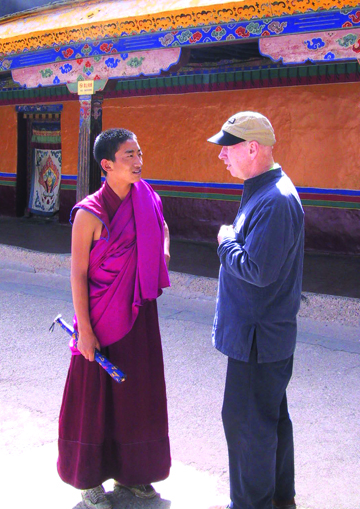A missionary vocation
Young people today are faced with a myriad of choices and decisions about what to do with their lives
By Fr. Brian Swords, S.F.M.
November/December 2008
Return to Table of Contents
Print Article
Most of us, at one time or another, have been faced with an opportunity to make some strategic choices. Do we want to pay the price for something or some relationship that we believe is valuable or required?
 For Scarboro missionary Fr. Brian Swords (above, chatting with a Buddhist monk in Tibet), his missionary priesthood to other lands has meant learning a different yet valid way of seeing and relating to and with God.
For Scarboro missionary Fr. Brian Swords (above, chatting with a Buddhist monk in Tibet), his missionary priesthood to other lands has meant learning a different yet valid way of seeing and relating to and with God.
Some 45 years ago I decided to make a specific faith choice. I decided to join Scarboro Missions. What would this investment require of me? Well for starters, I had to opt for a life of celibacy. As a missionary priest, I would have to forego sharing my life with a spouse, and children would not be a consideration. I also had to be willing to forego living and relating in my own country and culture, as I would be assigned abroad where I would be an outsider.
What have I received in return? The dividends have been more in the line of relationships, interdependency, and real appreciation of God’s ongoing dance with all peoples of the world. I have had the opportunity to learn a new language, have come to appreciate new foods, customs, and wonderful new people, true friends, and a different yet valid way of seeing and relating to and with God.
My missionary placement was to China—Taiwan, Hong Kong, and Mainland China. Although my Canadian identity and faith community were known and acknowledged, the fact that I was a missionary priest had to be kept secret for some 16 years on the Chinese Mainland. I had to serve as a quiet, hopeful, positive witness by presence alone. In this capacity I served as an English teacher.
On the Canadian Catholic scene I am aware of the decline in vocations to the priesthood on the diocesan, religious, and missionary fronts.
Young people today are faced with a myriad of choices and decisions about what to do with their lives. In the past, there were many more missionaries around to offer concrete examples of a missionary life, of what it means to spend many years walking among other cultures and faiths in other lands. Today the attractiveness of a missionary vocation is not readily visible or understood. It is, however, as essential as it has been historically, and possibly more so, as the world is more closely knit together by trade, communications, and travel. Missionaries are now appreciated more as bridges, helping us to recognize God’s gifts and presence in each person and in all peoples.
Secularization, modernity, bureaucracy, and scandals have possibly deflated the desire of those who are attempting to respond to an invitation by God to explore their call. To creatively address one’s vocation in today’s world is daunting; making a fundamental choice is not black and white. It takes a special type of person, one with a lot of fortitude, to investigate a response to God’s invitation to “go forth.”
Life for me is full of mystery and wonder. Scarboro Mission’s initial and ongoing contribution to God’s mission has been and is real. I stand in awe of the men and women who have gone abroad to serve as missionaries. Their contribution has evolved and developed, serving as a foundation for a focus of God’s mission that is continually unfolding.
As a senior citizen, I tend to want to celebrate and witness to a continuation of the old way of being and doing rather than developing and being challenged by fresh frontiers. Keeping an open mind and heart is easy to say but hard to do, for me anyway.
Willing to risk
Young people today exude hope and are willing to risk. Positive highlights of this strike me in the ever-evolving spirituality of the young generation. A spirit of volunteering, speaking out, defending ecology, self-development, and the list goes on.
As young people take up the mantle of responsibility to and with others, I am intrigued by their openness. How can and do they hold the importance of the individual over the requirements of the collective ‘other’, whether this other be a community, a people, or a nation? There is no doubt that they are living out their relationship with and in the Spirit. I am rarely privy to this, but I can and do see its concretization.
Return to Table of Contents
Print Article